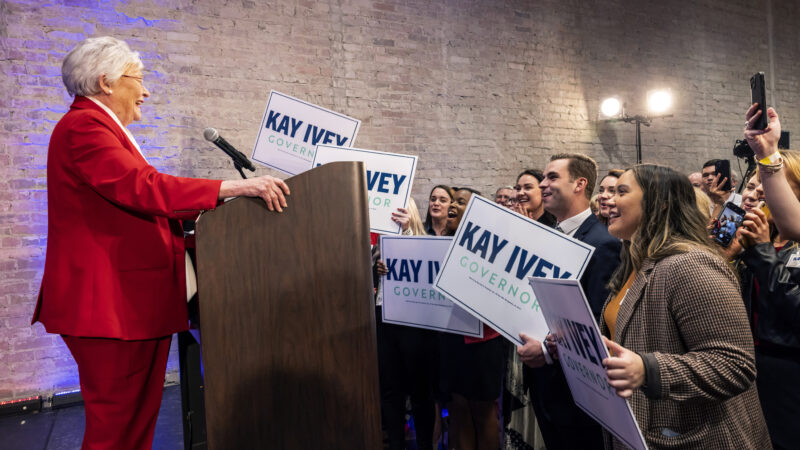Republican Kay Ivey wins 2nd full term as Alabama governor
Gov. Kay Ivey greets supporters at her election night watch party after Alabama voted in midterm elections, Tuesday, Nov. 8, 2022, in Montgomery, Ala.
By Jay Reeves, Associated Press
BIRMINGHAM, Ala. — Alabama Gov. Kay Ivey easily won a second full term Tuesday against Democrat Yolanda Flowers, the first Black woman to win a major party’s gubernatorial nomination in the state, after surviving both a health scare and multiple Republican challengers in the primary.
Smiling broadly and wearing a bright red jacket, Ivey took the stage before a huge American flag and waved to cheering supporters at a campaign celebration held at a restaurant in Montgomery.
“Y’all, we did it!” she exclaimed.
While Flowers’ candidacy was an interesting historical footnote, it posed no real threat to the GOP’s control of all three branches of government in a majority white, conservative state where voting patterns typically break down by skin color. Flowers closed her campaign with days of fasting and a lengthy prayer shown on Facebook.
Libertarian Jimmy Blake, a former Birmingham City Council member, also was on the ballot.
Ivey, who turned 78 in October, avoided a runoff in the spring despite facing a slate that included eight Republican challengers who forced her to the right. Ivey repeated former President Donald Trump’s lies about election theft and aired a campaign commercial in which she pulled a pistol out of her purse.
Following the primary, Ivey — who was diagnosed with early-stage lung cancer in 2019 and later said the disease was gone — was faced with questions about her health after she disappeared from public view for almost three weeks during the summer. She refused to say whether she underwent any medical treatment.
While Ivey’s absence made headlines, any doubts or concerns about her health didn’t have any effect on her chances of victory. At her party, a jubilant Ivey thanked voters.
“Folks, there’s no doubt that the best is yet to come because we all know there’s no step too high for a high stepper,” said Ivey, repeating a campaign mantra.
In her re-election bid, Ivey mostly ignored her opponents and instead touted the state’s low unemployment rate and opposition to the policies of Democratic President Joe Biden. She had a campaign bank balance of more than $200,000 at the end of September compared to just $546 for Flowers, records showed.
Ivey first became governor in April 2017, when she was elevated from the office of lieutenant governor following the resignation of Robert Bentley, who quit in a plea agreement following a scandal over his relationship with a female staffer. Ivey defeated an experienced, well-known Democratic challenger, Tuscaloosa Mayor Walt Maddox, by 20 percentage points in 2018 to claim her first full term.
U.S. and Iran to hold a third round of nuclear talks in Geneva
Iran and the United States prepared to meet Thursday in Geneva for nuclear negotiations, as America has gathered a fleet of aircraft and warships to the Middle East to pressure Tehran into a deal.
FIFA’s Infantino confident Mexico can co-host World Cup despite cartel violence
FIFA President Gianni Infantino says he has "complete confidence" in Mexico as a World Cup co-host despite days of cartel violence in the country that has left at least 70 people dead.
Supreme Court appears split in tax foreclosure case
At issue is whether a county can seize homeowners' residence for unpaid property taxes and sell the house at auction for less than the homeowners would get if they put their home on the market themselves.
Top House Dem wants Justice Department to explain missing Trump-related Epstein files
After NPR reporting revealed dozens of pages of Epstein files related to President Trump appear to be missing from the public record, a top House Democrat wants to know why.
ICE won’t be at polling places this year, a Trump DHS official promises
In a call with top state voting officials, a Department of Homeland Security official stated unequivocally that immigration agents would not be patrolling polling places during this year's midterms.
Cubans from US killed after speedboat opens fire on island’s troops, Havana says
Cuba says the 10 passengers on a boat that opened fire on its soldiers were armed Cubans living in the U.S. who were trying to infiltrate the island and unleash terrorism. Secretary of State Marco Rubio says the U.S. is gathering its own information.







